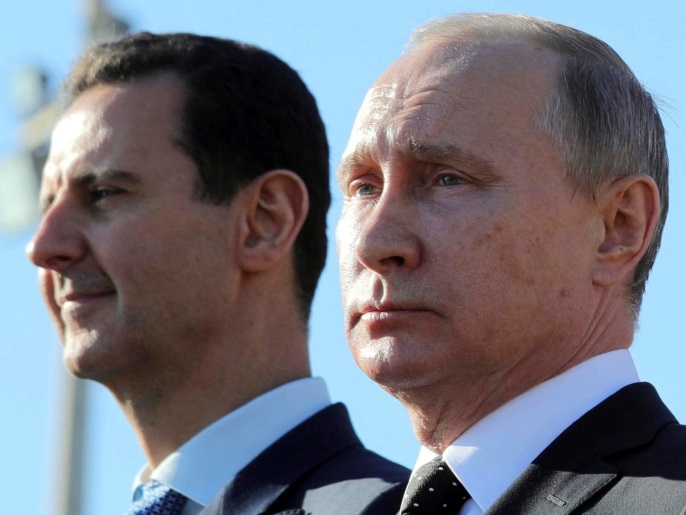French newspaper Le Monde said that the extreme violence and deliberate brutality of the current attack in Ukraine has prompted many commentators and even decision-makers to question the mental balance of Russian President Vladimir Putin, describing him as "crazy" or "paranoid". Understand the Ukraine war and its development in full without analyzing the deep convergence of views between Putin and his Syrian counterpart Bashar al-Assad.
French political science professor Jean-Pierre Filiu explained, in his column in the newspaper, that this view makes analyzes unnecessarily ambiguous, at a time when tragedy requires clarity more than ever, because the important thing is not denigration as much as it is an attempt to understand rational sources that may seem It is strange for us, but it is nevertheless driven by a deep logic, especially that the Syrian crisis could have provided an analytical measure for everyone who neglected it for a long time as a “secondary” theater compared to Europe.
Putin and Assad do not see in the "color revolutions", which are the result of supposed manipulation by Western intelligence, nor in the Syrian democratic opposition, only a handful of "terrorists" in the eyes of Assad, and "Nazis" in the eyes of Putin, who must be eliminated immediately.
Vladimir Assad
Filiu believes that Vladimir Putin's unconditional support for Bashar al-Assad since the beginning in Syria in March 2011 against peaceful protests cannot be explained by geopolitical considerations alone, as the two leaders share a broadly comparable view of the world, articulated by the political police they have been drinking. Its culture, as Putin received it when he was an officer in the former Soviet intelligence service "KGB", and Assad as a product of the Syrian "intelligence" that has the power of life or death over Syrian men and women.
This mysterious world in which the mentality of Putin and Assad was formed creates its own “alternative reality” in which the people do not exist, so that Putin and Assad do not see in the “color revolutions” which are the result of supposed manipulation by Western intelligence, nor in the Syrian democratic opposition but a handful of “ Terrorists" in the eyes of Assad, and "Nazis" in the eyes of Putin, must be eliminated immediately.
This rejection of any form of dialogue, and the desire to eliminate any critical voice was also fueled - as the writer says - the heir quality enjoyed by both Assad and Putin. Putin was officially appointed by Boris Yeltsin, the first president of Russia after the dissolution of the Soviet Union, as his successor. In the Kremlin in 2000, before he was officially elected president in May, with a percentage of 52.5%. As for Bashar, he succeeded his late father, Hafez al-Assad, who had been the absolute president of Syria since 1970. This family succession was established by a presidential vote with one candidate, in which the son won a percentage 99.7% of the votes.
The two heirs were not bent on defending the regime they now led each other at any cost, but rather nostalgic for an earlier one, in which democratic Ukraine challenges Russian tyranny for Putin, and where the power of the Soviet Union has been the balance of the United States for Assad, the Syrian tyrant who has praised the war on Syria. Ukraine described it as a "correction of history with the restoration of the tilted international balance since the fall of the Soviet Union".
Bashar Putin
As heirs to a system in which the political police are the oppressive framework, Putin and Assad also find themselves at the helm of a form of mafia union that must be carved out of national resources to encourage it in order to maintain the loyalty of patronage networks to power, and to organize them to avoid the formation of potentially opposition groups. The work of the “oligarchy” in Russia and the “barons” of the regime in Syria absorbs a large part of the tyrants’ energy, with scores settling sometimes at the top, as happened between Assad’s wife and one of his cousins, as the writer says.
But the entire ruling class unites - as Filio sees it - when it comes to defending its collective interests, which reinforces the determination of "Vladimir Assad" or "Bashar Putin" to crush any organized opposition, even a little. Today, the war on "terrorism" has contributed a lot. In justifying the Russian campaign in Syria since 2015, with signs of encouragement from France, it is now raising the slogan of "eliminating Nazism" in Ukraine.
Filiu concluded by recalling that Natalie Nogaeride wrote in April 2012, when she said that Putin in Chechnya, like Bashar al-Assad, "led a very ferocious military campaign against a part of his people, against the background of the impotence and negativity of the outside world," and then suggested that France consider suspending Its military-industrial cooperation with Russia and the abandonment of arms contracts in the name of protecting civilians, “as long as Moscow continues to assist a regime that commits crimes against humanity,” considering that this is “consistent with our declared values and our interests as well.”

